[2007] 1 SLR(R) 629 - Singapore Law
[2007] 1 SLR(R) 629 - Singapore Law
[2007] 1 SLR(R) 629 - Singapore Law
You also want an ePaper? Increase the reach of your titles
YUMPU automatically turns print PDFs into web optimized ePapers that Google loves.
656 SINGAPORE LAW REPORTS (REISSUE) [<strong>2007</strong>] 1 <strong>SLR</strong>(R)<br />
orders, such as a Mareva injunction, to assist foreign arbitrations which do<br />
not intrude upon the powers of foreign arbitrators or the foreign arbitration<br />
itself. A Mareva injunction merely enhances the efficacy of foreign<br />
arbitrations and does not regulate, restrict, stifle or otherwise control the<br />
conduct of the foreign arbitration. Ang J also referred to Lord Mustill’s<br />
reasoning in reaching the same conclusion: see Front Carriers ([4] supra) at<br />
[27]. However, this argument ignores the critical proviso to Lord Mustill’s<br />
statement at 365, ie:<br />
Provided that this and no more is what such measures aim to do, there<br />
is nothing in them contrary to the spirit of international arbitration.<br />
54 In our view, the proviso cuts the ground under Swift-Fortune’s case as<br />
a plain reading of s 12(7) of the IAA would also give power to the court to<br />
grant any of the orders and reliefs mentioned in s 12(1) to any party to an<br />
international arbitration. It is true that Swift-Fortune is only seeking a<br />
Mareva injunction under s 12(1)(i) read with s 12(7). But if s 12(7) allows<br />
this, it must also allow the court to grant the other orders or reliefs in<br />
s 12(1). We do not think that Parliament could have intended s 12(7) to<br />
have such an exorbitant reach by the use of the inaptly drafted phrase “an<br />
arbitration to which this Part applies”. If s 12(7) were applicable only to or<br />
could be read only to apply to the power in s 12(1)(i) the appellant might<br />
have a stronger card on its hands. Ang J appears to recognise this weakness<br />
in her reasoning as is evident from the limitation she placed on the kind of<br />
measures the court may grant under s 12(7): see Front Carriers at [26]. But<br />
this is not possible. As matters stand, Swift-Fortune’s interpretation of<br />
s 12(7) leaves it holding too many bad cards. The argument is ultimately<br />
self-defeating in over-reaching itself.<br />
55 Finally, apart from the intrusive effect that s 12(7) would have were it<br />
given a plain meaning, we would still have great difficulty in accepting an<br />
argument that implies that Parliament had enacted s 12(7) with the<br />
intention of permitting the courts to become universal providers of<br />
procedural orders and reliefs to assist all anticipated or ongoing<br />
international arbitrations (as defined in s 5(2) of the IAA) in any country in<br />
of the world, whether or not they are Model <strong>Law</strong> states or signatories to the<br />
New York Convention.<br />
Sections 6 and 7 of the IAA<br />
56 Counsel for Swift-Fortune has also contended that since ss 6 and 7 of<br />
the IAA (which are in Pt II) apply to all international arbitrations as defined<br />
in s 5(2) of the IAA, Pt II would be internally inconsistent unless s 12(7) is<br />
read to apply to all international arbitrations. Such a result should be<br />
avoided, and this can be done if the provisions were read harmoniously.<br />
Magnifica’s response, a contrario, is that ss 6 and 7 are exceptional<br />
provisions designed to cater to two specific situations as recommended by<br />
the Committee. It is further argued that ss 6 and 7 are consistent with


![[2007] 1 SLR(R) 629 - Singapore Law](https://img.yumpu.com/7082457/28/500x640/2007-1-slrr-629-singapore-law.jpg)
![[2011] 1 SLR 727 - Singapore Law](https://img.yumpu.com/51140774/1/166x260/2011-1-slr-727-singapore-law.jpg?quality=85)
![[1983-1984] SLR(R) 447 - Artic Builders & Co - Singapore Law](https://img.yumpu.com/50909204/1/164x260/1983-1984-slrr-447-artic-builders-co-singapore-law.jpg?quality=85)
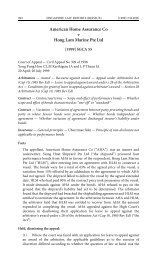
![[1996] 2 SLR(R) 292 - Lim Eng Hock Peter v ... - Singapore Law](https://img.yumpu.com/47482222/1/164x260/1996-2-slrr-292-lim-eng-hock-peter-v-singapore-law.jpg?quality=85)
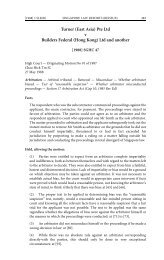
![[2006] 1 SLR(R) 197 - PT Asuransi Jasa Indonesia - Singapore Law](https://img.yumpu.com/46425352/1/164x260/2006-1-slrr-197-pt-asuransi-jasa-indonesia-singapore-law.jpg?quality=85)
![[1985-1986] SLR(R) 503 - Woh Hup (Pte) - Singapore Law](https://img.yumpu.com/45676364/1/164x260/1985-1986-slrr-503-woh-hup-pte-singapore-law.jpg?quality=85)
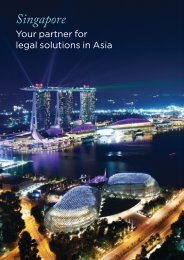
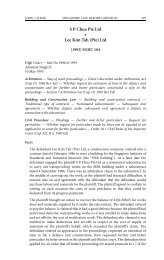
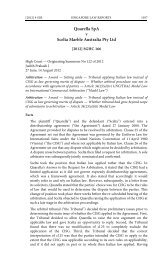
![[2010] 2 SLR 821 - Singapore Law](https://img.yumpu.com/43145563/1/166x260/2010-2-slr-821-singapore-law.jpg?quality=85)
![[2007] 1 SLR(R) 597 - PT Asuransi Jasa Indonesia - Singapore Law](https://img.yumpu.com/42983489/1/164x260/2007-1-slrr-597-pt-asuransi-jasa-indonesia-singapore-law.jpg?quality=85)
![[1989] 1 SLR(R) 433 - Singapore Law](https://img.yumpu.com/42649524/1/164x260/1989-1-slrr-433-singapore-law.jpg?quality=85)
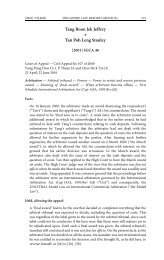
![[1997] 3 SLR(R) 360 - Singapore Law](https://img.yumpu.com/42287507/1/164x260/1997-3-slrr-360-singapore-law.jpg?quality=85)